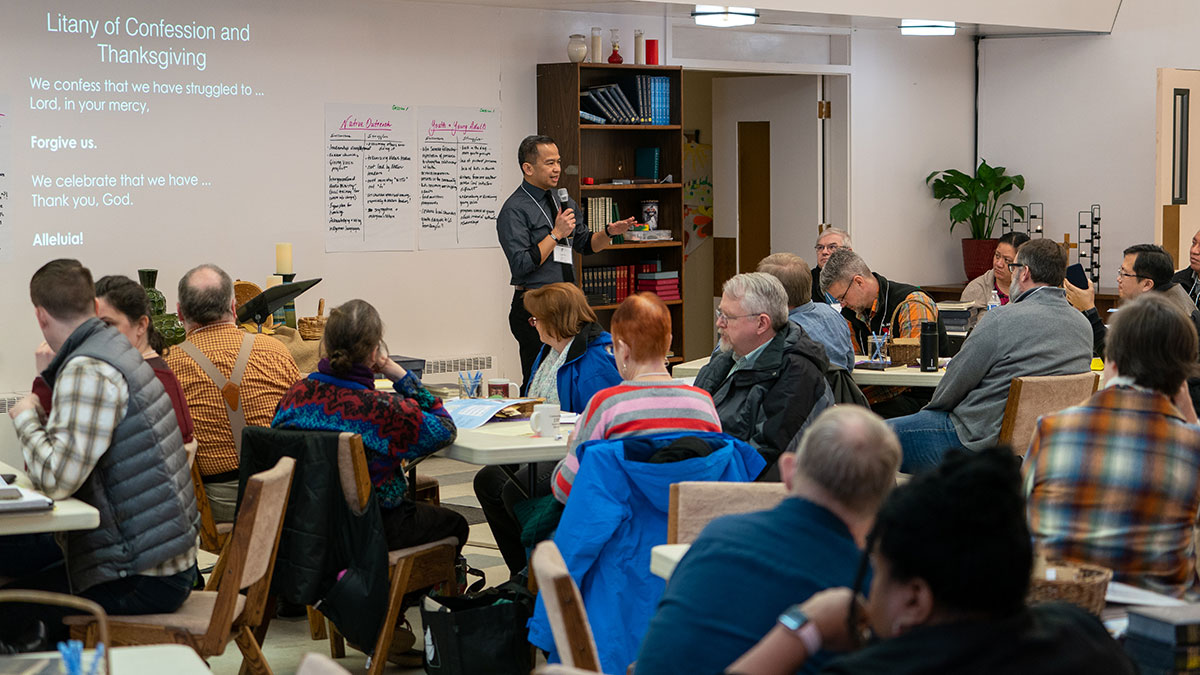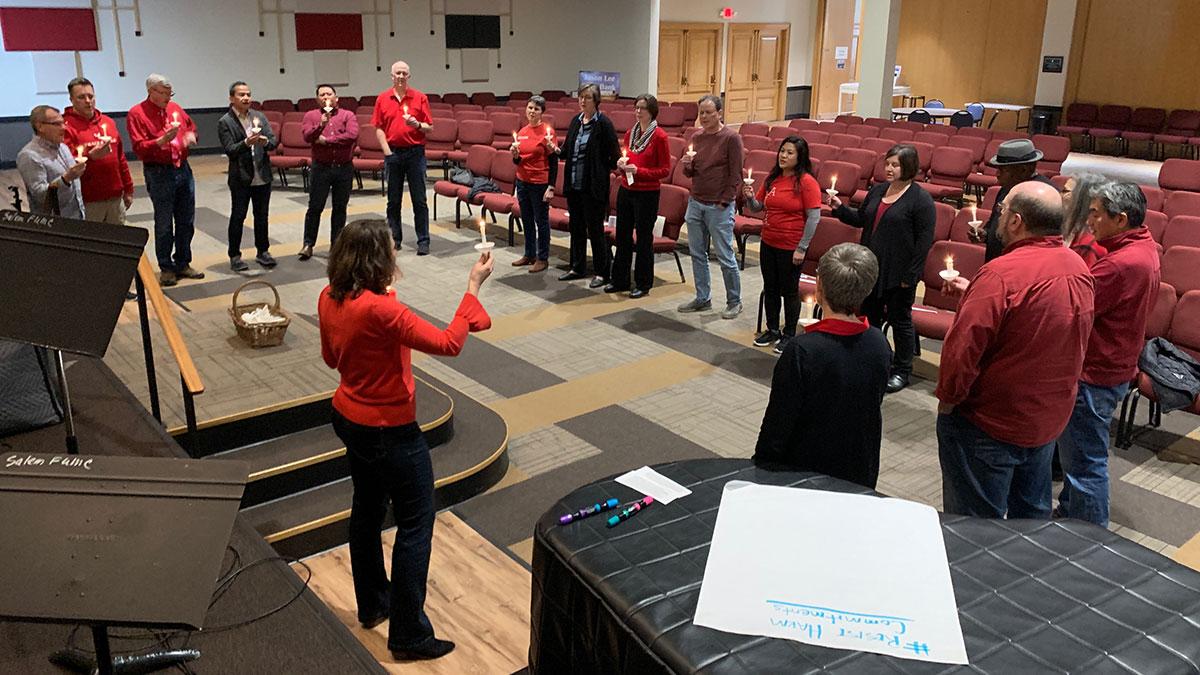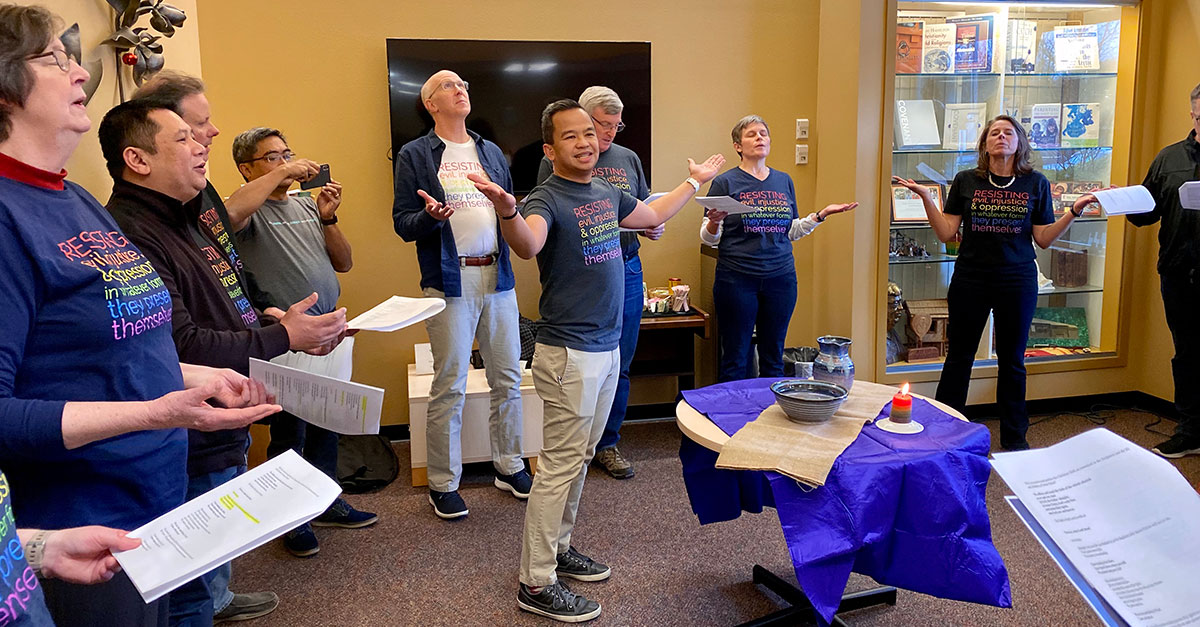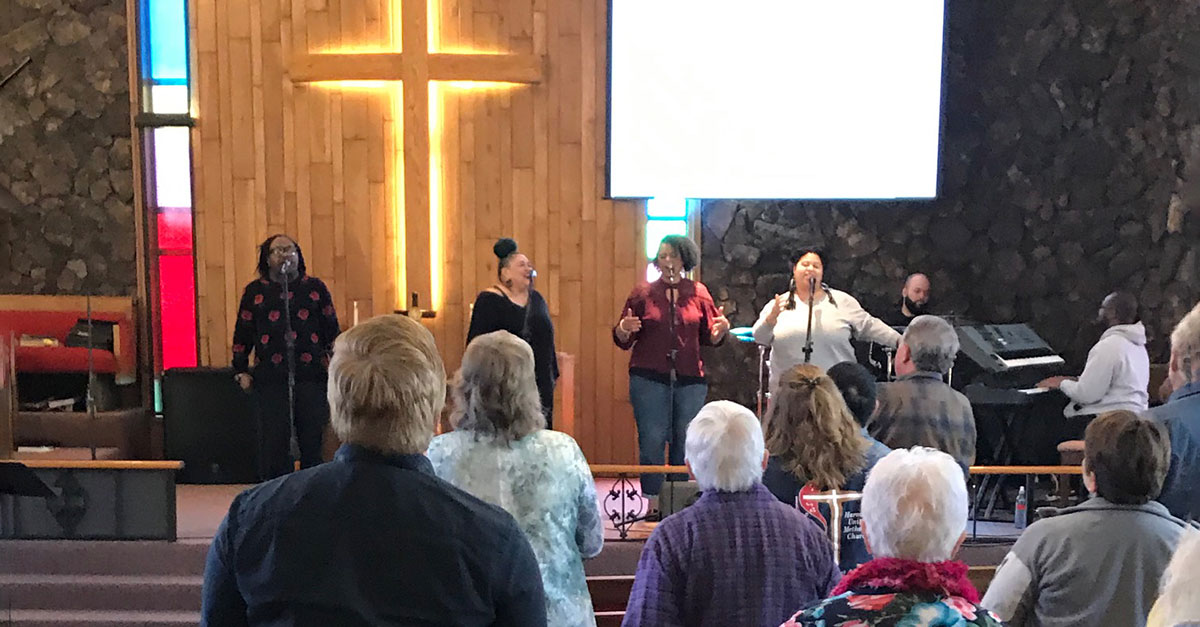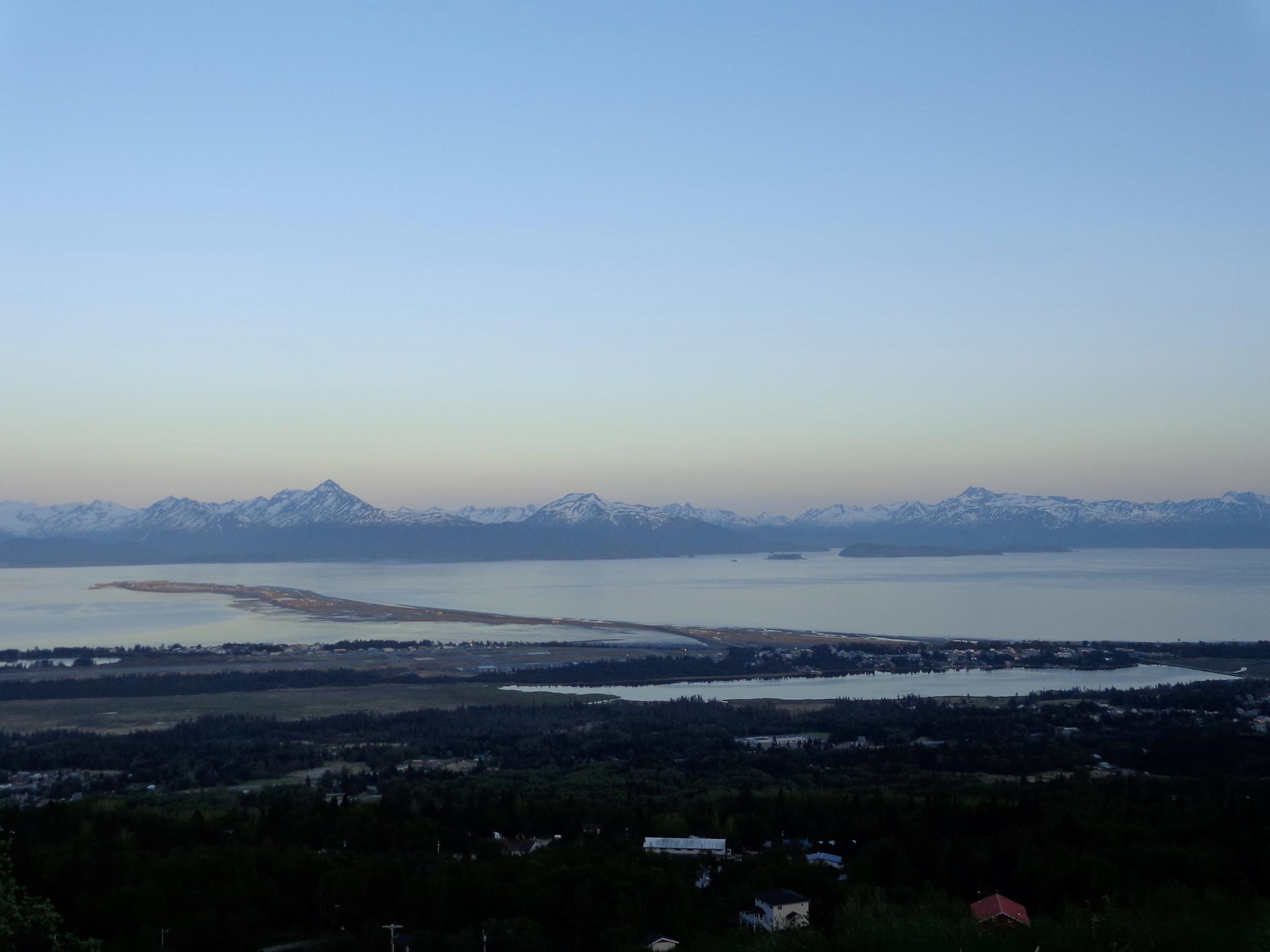A big decision in Alaska and its potential impact in the Pacific Northwest Conference
United Methodists in the Pacific Northwest Conference,
I’m writing you from Anchorage, Alaska, where clergy and laity from 29 churches across the state will gather on Saturday to decide whether to ask to remove its status as a missionary conference and to become part of the Pacific Northwest Annual Conference. This proposal was developed by the Alaska Conference Leadership Team, in response to several considerations:
- Financial and administrative support from the General Board of Global Ministries (GBGM) has diminished over the years and is likely to be discontinued in the near future.
- GBGM intends to discontinue missionary conferences within the United States altogether, which would require Alaska to be included in another Annual Conference.
- A sense that United Methodist Churches in the Western Jurisdiction of the US should take responsibility for supporting the ministries in their area that are not self-sustaining.
- A desire for Alaskan United Methodists to have a role in determining their own future, rather than waiting for others to determine their future.
If Alaskan United Methodists approve this proposal, it could have significant implications for the Pacific Northwest Conference. I want you to be aware of the important matters being considered this week, and their possible impacts on the Pacific Northwest Conference.
There are multiple steps to this process before it is final. The sequence of actions necessary for this change to occur is:
- February 22 – Alaskan United Methodists request to no longer be organized as a missionary conference.
- May 5-15 – General Conference approves this request.
- July 15-18 – Western Jurisdictional Conference redefines the boundaries of the Annual Conferences in the West to include the churches of Alaska in the Pacific Northwest Conference.
Of course, depending on what happens at General Conference, we will have the opportunity to discuss these matters in June, when the three conferences of the Greater Northwest Area – Alaska, Oregon-Idaho and Pacific Northwest – meet together in a shared Annual Conference session in Puyallup.
I hope that as you consider this possibility, and as you talk with your friends about it, your interest and concerns will be for the future of Methodist faithfulness in the northwest, and how we can be stronger together than we are separate.
God is at work in the Greater Northwest in powerful and hopeful ways. We are invited and privileged to be invited to join God’s work as United Methodist disciples of Jesus Christ. I look forward to the conversations and deliberations as these possibilities emerge during the spring and summer.

Bishop Elaine JW Stanovsky
Greater NW Cabinet continues to #ResistHarm with MLK reflection
Leadership changes in Oregon-Idaho Conference, Greater NW Area Cabinet
Changes are in store for the Greater Northwest Episcopal Area with a few changes in leadership positions in the Oregon-Idaho Conference, announced by Bishop Elaine JW Stanovsky on Monday.

The first will be adding Rev. Wendy Woodworth of Morningside UMC to the GNW cabinet when she begins serving as the Cascadia District Superintendent July 1.
“I can’t wait to hit the road and visit the diverse churches and ministry settings across the Cascadia District: from the coast to the mountains to the painted hills, from urban settings to the small towns, and from large churches to smaller ones,” she said. “Each of you is called to unique ministries in your context and yet all of us are called to the vital ministry of bringing God’s love, grace and justice into our communities by following Jesus and being empowered by the Spirit.”
Woodworth earned her master’s of divinity degree from Pacific School of Religion. She has served as an associate pastor at Portland First UMC, Pendleton, Portland Trinity UMC, Portland Fremont UMC, Salem Morningside UMC and now the Opeen Door Churches of Salem-Keizer, with primary responsibility at Morningside. She also served on the Conference’s Council on Finance and Administration for 12 years and currently serves as the chairperson of the Board of Ordained Ministry.
“You know Wendy’s deep faith, broad experience and steady demeanor. I know that you will celebrate with her this new responsibility and honor her for her seven years with Morningside and Open Door Churches. Please keep Wendy and her wife Lori, in your prayers during this time of transition,” Bishop Stanovsky said.

Rev. Tim Overton-Harris, who has been serving as the Cascadia District Superintendent since July 2017, will begin serving the Columbia District (which encompasses the metro Portland area) on July 1, 2020.
Prior to his position as District Superintendent, Overton-Harris served as pastor of Vermont Hills UMC. He started his ministry in the Oregon-Idaho Conference in Oregon City as an associate pastor. He moved on to serve churches in Estacada/Marquam, Salem Morningside, La Grande and Christ UMC in Portland. He is a graduate of Boston University School of Theology.
“The honor and challenge of serving Columbia District is great. The many and varied ministries, innovation projects, new starts, and the diverse communities of the district offer a unique opportunity for me,” he said. “I will build off of the faithful work of Erin and know that my skills, gifts and graces will be well used in my work with Columbia District.”

Rev. Erin Martin, who has served as the Columbia District Superintendent for the last five years, is to be appointed to Fremont United Methodist Church in Portland effective July 1, in place of Rev. Linda Quanstrom, who is returning to retirement.
Martin served at Wesley UMC in Eugene for nine years before becoming Columbia District Superintendent.
Greater Northwest Area Cabinet begins 2020 with pledge to Resist Harm as it continues to seed a vital, more inclusive church
By Patrick Scriven
Even as members of the Greater Northwest (GNW) Area Cabinet absorbed the implications of the proposed Protocol of Reconciliation & Grace Through Separation, they recommitted themselves to resisting elements of the Traditional Plan that took effect January 1. Meeting for the first time in 2020 last week, they joyfully reaffirmed their baptisms, pledging together to resist harm as they provide leadership to the Area.
Last November, the bishops of the Western Jurisdiction issued their Safe Harbor Declaration, explicitly refusing to implement the new provisions and prohibitions of the Traditional Plan. The GNW Area Cabinet welcomed this statement at the time and continues its move forward with the clear guidance it provides.
While the Protocol mentioned above includes a moratorium against the filing of charges against LGBTQ+ clergy, and those performing same-gender weddings, if passed, it would only create a pathway down which full inclusion could be reached. Stopping the harm is only one step down the path.
Both the Cabinet and the GNW Guiding Coalition are continuing to plan for a future of United Methodism in the Northwest that fully includes LGBTQ+ persons in the life of the Church. Additionally, they are continuing to learn and to foster practices, each time they meet, that will help the Area to center voices that are younger and more diverse, recognizing that there is both wisdom and vitality around a table with distinct perspectives.
The GNW’s Innovation Vitality Team offered the Cabinet an update on projects that are underway across the Area, work that includes both New projects (new church starts or new campus/multisite) and Vitality projects (existing church where an identified planter/innovator is appointed). Of the 37 supported projects, 20 (54%) are led by leaders of color.
Rev. Kathy Neary provided an update on her work with smaller congregations in the PNW Conference, sharing one of her insights this week on the PNW News Blog. The GNW Cabinet also discussed the promising work happening in rural areas through the Rural Church Engagement Initiative. Lynn Egli provides a short progress report you can read here.
Continuing its work of assessing and preparing for the leadership needs of GNW Area churches and ministries, the Cabinet finalized its initial list of Clear Appointment Openings. The practice of sharing Clear Openings allows clergy the opportunity to express an interest in a particular appointment while also allowing them to share their gifts and calling with the Cabinet as the discernment process begins.

Plans were also finalized at the meeting for the calling of a Special Session of the Alaska United Methodist Conference on February 22 in Anchorage to ask the 2020 General Conference to discontinue its status as a missionary conference. The Alaska Conference will also vote to petition the Western Jurisdictional Conference to provide affiliation and oversight, possibly as a mission district of another annual conference.
The Conference Treasurers provided the Cabinet with an end of year report on the apportionment giving of the Area’s three conferences. Apportionment receipts for the Alaska Conference reached 84.7% in 2019, down 2.03% from 2018; Oregon-Idaho Conference receipts reached 77.9% in 2019, down 5.4% from 2018; Pacific Northwest Conference receipts reached 93%, up .21% from 2018.
With the Cabinet meeting concluding late on Saturday, Cabinet members visited area churches for worship the following day. Twelve members were also able to attend parts of the UMC LEAD event that began later that day in Seattle, Washington. Bishop Stanovsky offered a greeting to attendees of the LEAD event, offering a word of encouragement and appreciation for The United Methodist leaders, many of whom had traveled across the country to participate.
Patrick Scriven serves as Director of Communications and Young People’s Ministries for the Pacific Northwest Conference of The United Methodist Church.
Need an IV, Stat!
Greater NW UMC Rural Church Engagement Initiative going strong
A Pastoral Letter for Epiphany 2020
United Methodists of the Greater Northwest,
What came into existence was Life, and the Life was Light to live by.
The Life-Light blazed out of the darkness; the darkness couldn’t put it out…
We saw the glory with our own eyes…
Generous inside and out, true from start to finish.
John 1, The Message
This morning United Methodists around the world received a word of hope that the strife that has racked our Church might find a peaceful end.
A group of sixteen United Methodist leaders from around the world, who hold a wide range of theological and social convictions, have negotiated protocols for a graceful separation within The United Methodist Church. If adopted by the General Conference in May, the proposal would:
- Maintain The United Methodist Church intact.
- Allow local churches and annual conferences that choose not to remain affiliated with The United Methodist Church to leave, while maintaining their property, assets, and liabilities.
- Commit $39 million to racial and ethnic inclusion and anti-racism work.
- Convene the first session of the post-separation United Methodist Church, perhaps before leaving Minneapolis in May, to create four regional conferences.
- Allow for the first session of the newly established North American Regional Conference to act on proposals to remove prohibitive language regarding LGBTQ clergy and weddings. In the meantime, signers to the Protocol have agreed to abeyance on complaints against clergy for related offenses.
While this is not the resolution I hope for, I believe it may be the best next step for the people called United Methodists who have been unable to find a way forward that maintains the unity of the Church. It does not move the Church toward Christ’s vision that we “may all be one…so that the world may believe” (John 17:21), but it is a faithful effort “to maintain the unity of the Spirit in the bond of peace” (Ephesians 4:3), even as we find it necessary to walk separate paths for a season.
I trust this proposal is designed to unbind us from our “irreconcilable differences” and free us to focus on the future. It does not guarantee a particular outcome, but it appears to offer United Methodists in the United States the opportunity to choose a future that is fully inclusive of LGBTQ persons.
Please read the attached proposal, asking prayerfully whether it offers Life and Light as we seek to create a new movement of Wesleyan faithfulness in the Northwest and around the world.
May the Life of Christ live in us, and the Light of Christ lead us into the future,

Bishop Elaine JW Stanovsky
A Christmas Message from Bishop Stanovsky – 2019
Please enjoy this Christmas message for United Methodists across the Greater Northwest Episcopal Area from Bishop Elaine JW Stanovsky. She invites us to step outside to see what God is up to beneath the surface.
TRANSCRIPT
When I was a little girl and it was just about Christmastime, we’d go out as a family in the station wagon and we’d get a Christmas tree at a lot. We’d bring it home and we’d get out the boxes of decorations to hang on the tree, and when we came to the tinsel, the shiny tinsel; in my family we called it rain.
Now, my friends when I grew up made fun of me for that. They thought hanging rain on a tree was a pretty dismal thing to do. But as a child, it was the rain that reflected the light and that reflected symbolically the love of God in our lives, and so that taught me that at Christmas time it isn’t so much about what’s really going on on the surface of things. It’s really about what’s going on in here that matters.
That amazing couple, Joseph and Mary, traveled to a distant town. It’d be like my family going to the mountains of western Virginia where my family first migrated to this nation.
They were in a place they didn’t know.
They were not among family.
They were about to have a baby out of wedlock.
They were homeless.
They were displaced.
They were alone.
And it was there that they experienced this amazing miracle as this tiny baby was born to them. God’s miracle that life can come with joy, and anticipation, and incredible blessing even in the worst of circumstances. And so, we all these years later, we celebrate what happened that night and we do it by lighting lights and listening to music, making music, singing music. We do it by eating great food and inviting people over to our homes and saying, “Oh, let’s get together and celebrate this amazing thing that happened to Joseph and Mary when the tiny baby Jesus was born.”
You know you can get lost in all of that. You can make it about the food and the song and the lights.
I invite you this Christmas to step outside.
Step outside of your home.
Step outside of your preparation.
Step outside of your expectations, your anxiety.
Step outside of your sorrow to see what God’s up to this year this Christmas. What’s being born?
Step outside to see the goodness, the kindness, how merciful God is, and take a deep breath.
The heavens will dance. Peace will settle gently. Hope will shine again and anew for us. God is faithful. God is steadfast.
May it be to us according to God’s promises for this day, for our lives, for our church, for our nation, for the whole beautiful world. A blessing to you. Amen.
Video by Rev. David Valera, Exec. Dir. of Connectional Ministries (PNW)
Alaska Conference surprises GNW Area with generous gift
In this season of uncertainty and anticipation and about the future of The United Methodist Church, its heartwarming to see generosity flowing multiple directions across The Greater Northwest Episcopal Area.
This summer the Pacific Northwest and Oregon-Idaho Conferences committed to a special offering in the local churches to help lower the cost of Alaska Conference members traveling to Puyallup, Wash., for a shared Annual Conference this June. When a cry went out from churches in Oregon, Idaho and Washington located far from the Conference site, the Alaska Conference responded in kind for their siblings in Christ in the Oregon-Idaho Conference who will also endure significant travel costs to attend.
“People just really resonated with the idea that we want to come alongside in solidarity,” said Rev. Carlo Rapanut, Superintendent for the Alaska Conference.

This reciprocal giving from the Alaska Conference for a travel fund started after Rapanut received inspiration during a General Board of Global Ministries gathering in Atlanta earlier in the fall.
Bishop Hector Ortiz-Vidal of Puerto Rico asked for a moment of privilege during the gathering and called on Bishop Tom Bickerton, president of United Methodist Committee on Relief (UMCOR) to stand with him. Churches and communities in Puerto Rico received massive UMCOR support in 2017 after Hurricane Maria.
“Bishop Ortiz takes out an envelope with a check in it and says, ‘this is a gift from the thankful people of Puerto Rico,’” Rapanut recalled from the presentation.
Ortiz said the check, a significant amount, was being presented to help those in the Bahamas recovering from Hurricane Dorian in 2019.
“Everybody was in tears. (Puerto Ricans) are people still in need, yet they wanted to help people in the Bahamas,” Rapanut said. “It was just a Holy Spirit moment for me.”
Rapanut came back from that meeting and wanted to inspire his church members — many of whom will travel hours to get on a plane to fly to Anchorage to connect another flight to Seattle – that are already financially strapped to extend their generosity beyond Alaska’s boundaries.
He personally promised $50 at each of his charge conference gatherings to raise fund to assist remote churches in the other two GNW conferences with travel expenses. To date the 29 churches in the Alaska Conference have given $4,271.
“The response has just been incredible,” Rapanut said.
The PNW and Oregon-Idaho Conferences have raised approximately $11,000 to date to assist with Alaska travel funds.
The GNW Area cabinet recently met and decided, because of distance, it would be up to Sage District Superintendent Rev. Karen Hernandez and Crater Lake District Superintendent Rev. John Tucker to utilize this gift. The two district superintendents in the Oregon-Idaho Conference are still working out exactly which churches will qualify for the support.
“In a time of crisis in the denomination, when the Alaska Conference is trying map out its future with limited finances, this is the most beautiful response I can imagine,” Hernandez said. “Because of the timing it’s so selfless of them.”
Homer United Methodist Church responded to Rapanut’s call with great enthusiasm, raising more than $1,000 for the other two conferences.

Rev. Lisa Talbott, pastor of Homer UMC said their church has been supported by churches in the lower 48 states for more than 70 years, allowing it to establish its ministries in Homer and the lower Kenai Peninsula of Alaska.
“[The churches] sustained us through really tight years. Now that we are a financially self-sustaining church this is our response with gratitude toward the churches who may have supported us,” Talbott said. “For me this is also a way to remind everyone that mission and ministry don’t go in one direction in the Greater Northwest Area. We are all partners in ministry together.”

